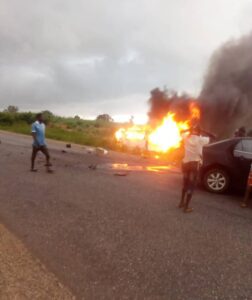


By Dada Ahmed.
Describing it as amazing is not an exaggeration, given the gravity of the event and the shock it has elicited both locally and far beyond.
Family members with loved ones traveling on August 29 through north eastern part of Nigeria were deeply concerned for their safety when news of the tragic accident emerged.
Eyewitnesses have described the crash, involving a collision and a vehicle completely engulfed in flames on Alekaleri Road, outskirts of Bauchi, as horrifying and gruesome.
Others have characterized it as a disturbing and frightening sight, evoking a strong sense of dread, with the incident being deemed ghastly.
Fortunately, all the seven occupants of the vehicles, including five NYSC members, survived the accident. They were later transported to Yala, Adamawa State, in a different vehicle provided by the NYSC.
Reports from the accident scene indicate that the driver of the burnt vehicle was advised by a passenger to reduce speed, but the driver ignored the warning.
One of the victims, Stephen, laments, “I don’t know how we escaped death in this terrible accident. Only God could have done this. We thank Him for preserving our lives.”
The survival of those involved highlights the importance of constant and fervent prayers for safety in all endeavors. It also serves as a crucial reminder for drivers to practice patience and adopt responsible driving habits by keeping to the rules and regulations of driving to ensure safety of life and property on the roads.
Some parents, whose children are serving in various states across the federation, thank Almighty God for the safety of those involved in the major accident. However, they urge the National Youth Service Corps (NYSC) management to reconsider their policy of posting corps members far from their states of origin.
While acknowledging the NYSC’s role in fostering national unity, the parents argue that current insecurity and harsh economic conditions do not support such distant postings. They advocate for posting corps members to neighboring states to mitigate the high cost of transportation, guard against insecurity on road, and facilitate prompt assistance in case of accident or health emergencies.


